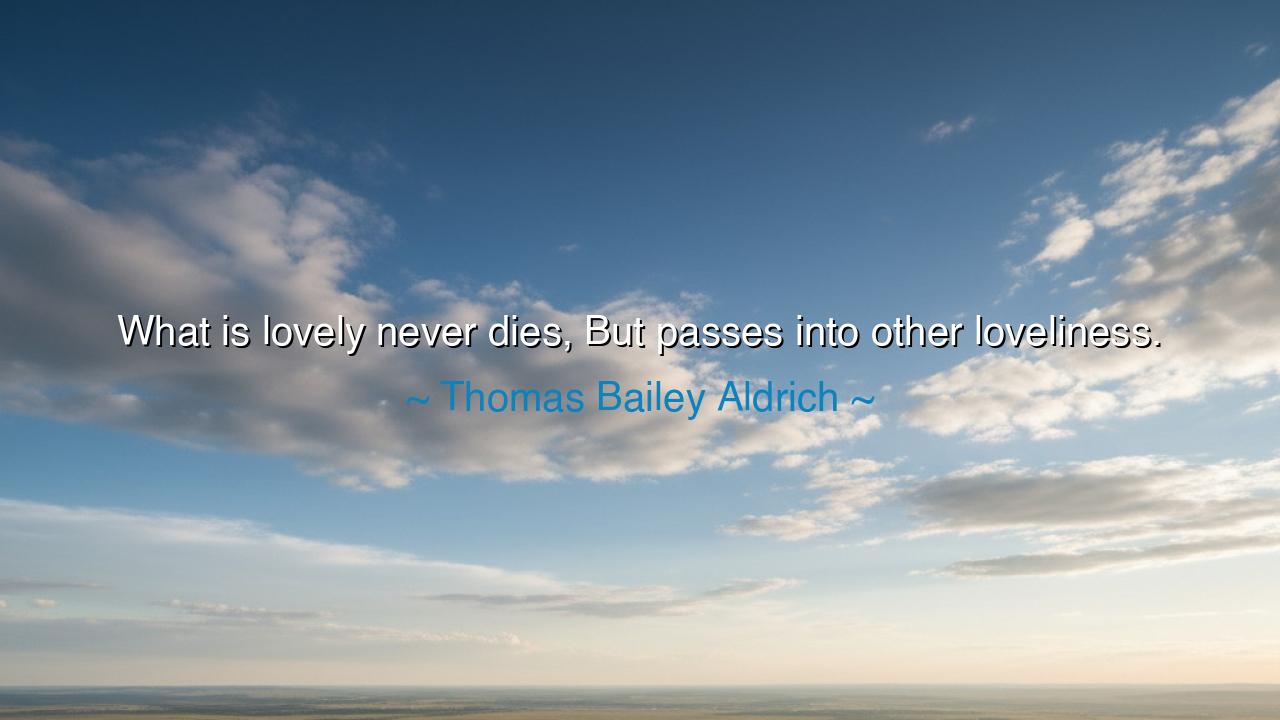
What is lovely never dies, But passes into other loveliness.






Hear the tender words of Thomas Bailey Aldrich, poet of the nineteenth century, who wrote: “What is lovely never dies, but passes into other loveliness.” In this verse he gave voice to one of the most enduring truths: that beauty, goodness, and love are not bound to perish with the body, but flow onward, transforming, reappearing in new forms, breathing eternal life into the world. For though all things mortal fall into dust, the essence of what is lovely continues its journey, unbroken by time.
Aldrich lived in an age when loss was a constant companion—families torn by war, children taken by illness, loved ones gone too soon. His words arose not from idle dreaming, but from a soul that had gazed upon sorrow and sought to find in it the seed of consolation. By declaring that the lovely never truly dies, he spoke to those who mourned, assuring them that while faces fade, the beauty they carried is reborn elsewhere—in memory, in nature, in the lives they touched.
The ancients too believed this. The Greeks spoke of the eternal return of beauty: the flower that withers in autumn is not destroyed, but reborn in spring. Plato taught that all earthly beauty was but a reflection of the divine, and that while bodies perish, the form of beauty endures, untouchable by decay. Aldrich’s verse is but the echo of this ancient wisdom: what is noble, true, and radiant cannot be extinguished—it only changes shape, becoming “other loveliness.”
Consider, O listener, the story of Anne Frank. Her life was brief, cut down in the darkness of war, yet her words have lived on for generations. She once wrote that she still believed in the goodness of people. That loveliness, though her body perished, did not die with her. It passed into her diary, into the hearts of millions, into the enduring witness of courage and hope in the face of despair. Here Aldrich’s truth is plain: beauty transforms, it is never lost.
So too in the natural world. The setting sun is swallowed by night, yet its light does not die—it returns in dawn, rising anew in other colors. The leaf falls from the tree, but in its decay it nourishes the soil, bringing forth new growth in seasons to come. In every corner of creation, we see the cycle of passing and renewal. The lovely does not end; it continues its pilgrimage, finding new forms through which to shine.
The lesson for us, O seeker, is this: cling not in despair to what is gone, but open your eyes to the other loveliness into which it has transformed. The smile of one who is lost may live on in a child’s laughter; the kindness of a friend may ripple outward into countless unseen acts of mercy. If you train your spirit to look with reverence, you will see that the world is full of inheritances of beauty—threads woven by those who came before, now shining in new cloth.
Therefore, when sorrow comes, do not believe that all has ended. Say instead: what is lovely has merely changed its garment. Honor the past by seeking the new beauty it has become. Plant trees for those not yet born, speak words that will outlive you, and know that even when you depart, what was radiant in you will pass into “other loveliness.”
So remember Aldrich’s wisdom: death is not the end of beauty, but its transformation. Nothing noble, nothing true, nothing filled with love is ever wasted. It flows onward, carried like light across time. And if you live in such a way that your life is filled with loveliness, then you too shall never truly die, but will live on in other forms of beauty, blessing the world long after your footsteps fade.






AAdministratorAdministrator
Welcome, honored guests. Please leave a comment, we will respond soon